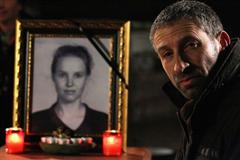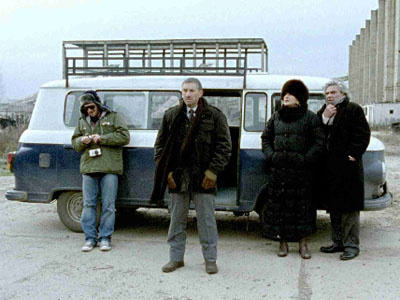Feminists in Focus: The Launch of Lilith’s Film Blog!
 We are so excited to announce the launch of something new, special, and unique to Lilith online: our new feature column on the Lilith blog, Feminists In Focus: Film News and Reviews. In this series, we’ll be bringing you incisive film commentary and context from fabulous (and feminist!) film critics. You’ll get a fresh perspective on films playing right in your area, and leads to movies so rare–or so new–that they haven’t even been screened yet at your local indie film festival.
We are so excited to announce the launch of something new, special, and unique to Lilith online: our new feature column on the Lilith blog, Feminists In Focus: Film News and Reviews. In this series, we’ll be bringing you incisive film commentary and context from fabulous (and feminist!) film critics. You’ll get a fresh perspective on films playing right in your area, and leads to movies so rare–or so new–that they haven’t even been screened yet at your local indie film festival.
For our inaugural post, we present a thought-provoking review from Amy Kronish, who writes and lectures widely on Israeli cinema. She served for 15 years as the Curator of Jewish and Israel Film at the Jerusalem Cinematheque – Israeli Film Archive, and more recently directed coexistence programs at the Jerusalem International YMCA. She is the author of two books on Israeli Film– World Cinema: Israel (1996) and Israeli Film-A Reference Guide (2003). Born and bred in the United States, she has an MA in Communications from NYU and has lived in Jerusalem since 1979. She blogs at www.israelfilm.blogspot.com.
Read on, enjoy, and talk back! We’re eager to know what you’re focusing on in the world of film.
The Human Resources Manager
Directed by Eran Riklis (Israel, 2010)
 At a time when we’re seeing many films about dislocation and migrant labor, along comes a new film on the subject that is actually an atonement for society’s treatment of the migrant workers in our midst. The Human Resources Manager, directed by Eran Riklis, is not the ordinary migrant worker story. From the opening sequence we know Yulia has been murdered by a suicide bomber, and her life is now proof that migrant workers are just as human as anyone else; in fact, they can even be just as “Israeli” as any other Israeli, when it comes to the ever-present threat of death.
At a time when we’re seeing many films about dislocation and migrant labor, along comes a new film on the subject that is actually an atonement for society’s treatment of the migrant workers in our midst. The Human Resources Manager, directed by Eran Riklis, is not the ordinary migrant worker story. From the opening sequence we know Yulia has been murdered by a suicide bomber, and her life is now proof that migrant workers are just as human as anyone else; in fact, they can even be just as “Israeli” as any other Israeli, when it comes to the ever-present threat of death.
The irony is that, here in Israel, we call these people “foreign workers,” not “migrant workers,” implying that they never really can become truly Israeli, even though they live and work as Israelis–and in this case, tragically, even die as Israelis. ¬ A very short summary: The human resources manager at a Jerusalem bakery learns that Yulia, a victim of a recent suicide bombing who has been in the morgue, unidentified for days, was actually employed by his bakery. How could he have missed the fact that she was missing? Scape-goated by his employer, who needs to pin the blame on someone, the manager is given the chance to redeem himself by accompanying Yulia’s coffin back to Romania, her homeland.
The film is an adaptation of A.B. Yehoshua’s A Woman in Jerusalem. At the premiere in Israel, held at the Haifa International Film Festival, Yehoshua himself talked to the audience about his motivation to write this story: after a friend was killed in a terrorist bombing, he became aware of how problematic public bereavement is in Israel. We all know, Yehoshua said, what to do when a soldier is killed–there are rituals and routines; but civilian casualties leave us feeling lost, both publicly and privately, without a structure to help us deal with grief and to resolve it.
There are two particularly interesting gender issues in this film. First, the unnamed human resources manager is portrayed as a stereotypically egocentric Israeli man, obsessed with work, having no time for his family. During the course of the film there is a transformation — from obsession to compassion, from a self-centered life to one in which you permit yourself to make sacrifices for others. This is the new Israeli male, and the visual metaphor for this transformation is wonderful – an Israeli man driving an armored troop carrier through the snow-covered, rugged terrain, not for military purposes, but desperately trying to help a teenage boy bring his mother’s body home for burial.
The second issue deals with the portrayal of Yulia herself. As the victim of a terrorist bombing, and as a woman, she has no voice, no desires. When the human resources manager was summarily shipped off to Romania with her coffin, I asked myself, “What would Yulia have wanted? Who was this woman?” We discover that she was dearly beloved – by another worker at the bakery, by her son, and by her mother. Why was she living in a run-down apartment in an ultra-orthodox section of Jerusalem, far from her family? Where would she have wanted to be buried? During the course of the film, the answers to only some of these questions become clear.
The film is a tour-de-force for Riklis, Israel’s acclaimed director of Cup Final, The Lemon Tree and Syrian Bride. It won an award at Locarno and three Israeli Ophir Awards — for direction, best film and best screenplay — making The Human Resources Manager Israel’s entry to the American Academy Awards. The film includes extraordinarily beautiful scenes of the Romanian countryside and the screenplay includes quirky and deep characters. Noah Stollman’s screenplay brilliantly combines tragedy and comedy, and in just the right proportions.
— Amy Kronish



